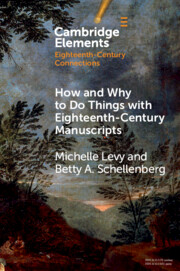Disavowing Disability
Richard Baxter and the Conditions of Salvation
$22.00 ( ) USD
Part of Elements in Eighteenth-Century Connections
- Author: Andrew McKendry, Nord University
- Date Published: July 2021
- availability: This ISBN is for an eBook version which is distributed on our behalf by a third party.
- format: Adobe eBook Reader
- isbn: 9781108910880
Find out more about Cambridge eBooks
$
22.00 USD
( )
Adobe eBook Reader
Other available formats:
Paperback
Looking for an examination copy?
If you are interested in the title for your course we can consider offering an examination copy. To register your interest please contact [email protected] providing details of the course you are teaching.
-
Disavowing Disability examines the role that disability, both as a concept and an experience, played in seventeenth-century debates about salvation and religious practice. Exploring how the use and definition of the term 'disability' functioned to allocate agency and culpability, this study argues that the post-Restoration imperative to capacitate 'all men'—not just the 'elect'—entailed a conceptual circumscription of disability, one premised on a normative imputation of capability. The work of Richard Baxter, sometimes considered a harbinger of 'modernity' and one of the most influential divines of the Long Eighteenth Century, elucidates this multifarious process of enabling. In constructing an ideology of ability that imposed moral self-determination, Baxter encountered a germinal form of the 'problem' of disability in liberal theory. While a strategy of 'inclusionism' served to assimilate most manifestations of alterity, melancholy presented an intractability that frustrated the logic of rehabilitation in fatal ways. This title is also available as Open Access on Cambridge Core.
Reviews & endorsements
‘a fresh, engaging, and exciting work that breaks new ground at an important intersection between disability and religion, a volume that will be required reading for scholars in these fields.’ Maura Brady, Reformation
See more reviews‘The significance of this book lies in its seemingly effortless but deeply rigorous interdisciplinarity and lightly worn erudition … The virtue of McKendry’s account is its astute combination of the tools of theology with literary criticism and disability studies … It illuminates the contours of Baxter’s enormous theological project in connection with his life (and how he narrates it) and demonstrates in a fresh and generative way how Baxter acted as a key mediator and innovator of theological models that continue to shape ableist assumptions of the individual subject within secular, liberal theories of the self.’ Alison Searle, Church History and Religious Culture
Customer reviews
Not yet reviewed
Be the first to review
Review was not posted due to profanity
×Product details
- Date Published: July 2021
- format: Adobe eBook Reader
- isbn: 9781108910880
- availability: This ISBN is for an eBook version which is distributed on our behalf by a third party.
Table of Contents
1. Introduction
2. Contexts and Connections
3. Enabling 'Every Man'
4. Disputing Disability, Conditioning Salvation
5. Diversity, Inclusion(ism), Discipline
6. Melancholy, Means, Ends
7. Conclusion.-
General Resources
Find resources associated with this title
Type Name Unlocked * Format Size Showing of
This title is supported by one or more locked resources. Access to locked resources is granted exclusively by Cambridge University Press to instructors whose faculty status has been verified. To gain access to locked resources, instructors should sign in to or register for a Cambridge user account.
Please use locked resources responsibly and exercise your professional discretion when choosing how you share these materials with your students. Other instructors may wish to use locked resources for assessment purposes and their usefulness is undermined when the source files (for example, solution manuals or test banks) are shared online or via social networks.
Supplementary resources are subject to copyright. Instructors are permitted to view, print or download these resources for use in their teaching, but may not change them or use them for commercial gain.
If you are having problems accessing these resources please contact [email protected].
Sorry, this resource is locked
Please register or sign in to request access. If you are having problems accessing these resources please email [email protected]
Register Sign in» Proceed
You are now leaving the Cambridge University Press website. Your eBook purchase and download will be completed by our partner www.ebooks.com. Please see the permission section of the www.ebooks.com catalogue page for details of the print & copy limits on our eBooks.
Continue ×Are you sure you want to delete your account?
This cannot be undone.
Thank you for your feedback which will help us improve our service.
If you requested a response, we will make sure to get back to you shortly.
×






